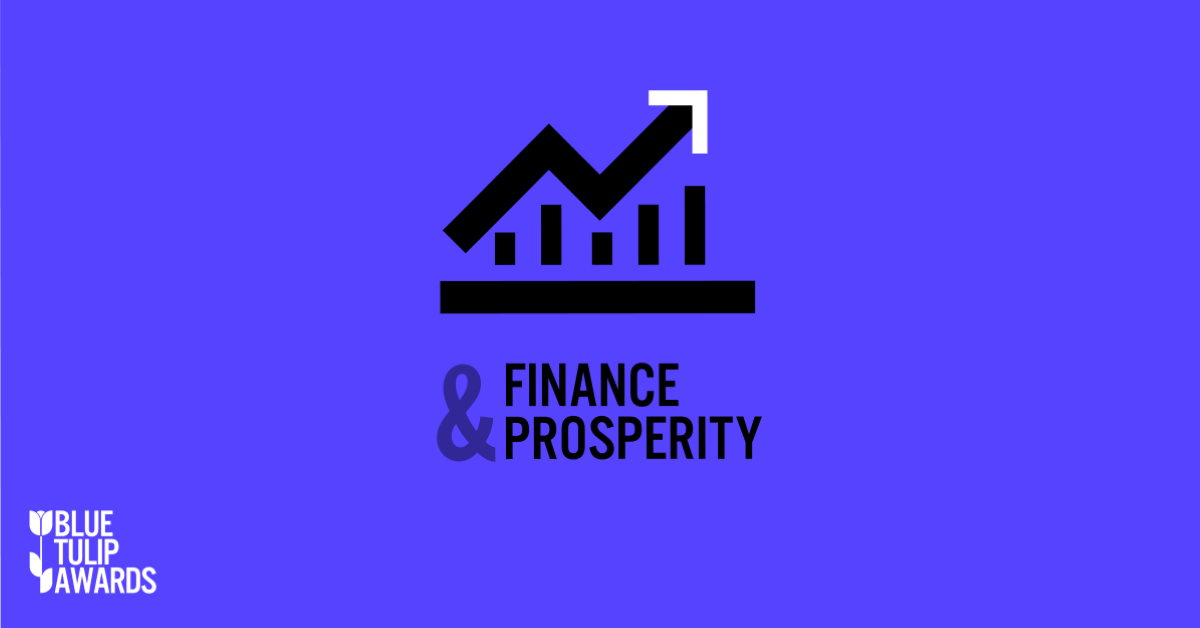The financial world is in rapid development. Customers have different needs, products move online, companies turn digital. But losing customers that live solely offline, is not something the industry can afford. At the same time, it’s navigating a complex web of rules and regulations. It’s a complex puzzle in which innovation is essential. That is why the Blue Tulip Awards has opened registrations to find innovations in the Finance & Prosperity theme.
The COVID-effect on the financial world
To find out how to face these massive challenges, the Blue Tulip Awards can reach out to a vast pool of experts. We speak with three of them. Suzanne Kröner-Rosmalen is a Senior Associate at law firm Stibbe and partner of the Blue Tulip Awards. Andrew Gowasack is the founder and CEO of Trust Stamp, which won last years’ Blue Tulip Awards in the Finance theme. Armand van Wolferen is CIO at Dutch bank NIBC and a jury member of the Finance & Prosperity theme.
With the changes in society due to COVID-19 and its countermeasures, the needs and demands for financial services changed, according to Armand van Wolferen. “People are looking for a Bol.com experience at their bank”, he says, referring to the popular Dutch online retailer, acting basically as Amazon in The Netherlands.
Let the data work for you
The ease of use for the customer and the smart use of data from the business side makes it an example for van Wolferen on how financial institutions can act. “Data-analytics will be very important for financial institutions. If I’d work in a commercial department, I’d love to have a 360degrees view of my customer. If you’ve got your data management in order, you will be able to use that data, let it work for you.”
Van Wolferen is responsible for the technology at NIBC, a business focussed bank from the Netherlands, serving around 600 SMBs and 400,000 consumers based in the Northwestern part of Europe. As CIO, Van Wolferen drives the digital transformation, which means he’s the one advancing the vision for technology at the bank.
A prime example of how financial institutions could take innovative retailers as an example is to speed up the processes currently involved in getting new loans for consumers or business owners. The same goes for offering relevant information on financial products or providing documents to the bank. “Technology can be a supporting factor, says Van Wolferen. Especially in these times: “If you can’t leave the house, you need to look for digital ways to do business.”
If it was up to Van Wolferen, people working in the financial industry would become more tech-savvy. “Not just in the IT-departments. Everyone needs a healthy curiosity about what technology can do for them. Tech is very broad and especially with developments in low-code and no-code, the boundaries between traditional business and IT are fading.”
Laws created for technologies from the past
Disrupting the financial industry by using technology is easier said than done. Every new technology needs to comply with many rules and regulations says Suzanne Kröner-Rosmalen. As Senior Associate at law firm Stibbe she is helping financial institutions and fintechs to deal with the applicable laws. What makes it extra challenging is that the law is always lagging behind, says Kröner-Rosmalen. “The laws that are taking effect now, have been created for technologies of the past.”
“We like to look at opportunities, not challenges, and we want to make sure there’s no holding back as a result of a new wave of rules. In my experience, the Netherlands takes a leading role. There is a good climate for it now. Many international organisations reorient themselves towards the Netherlands, for instance, due to Brexit. But besides that, there are many innovative people here who want to do good.”
Sustainability in fintech
An important point of focus in Kröner-Rosmalen’s work is sustainability in the financial industry: “This is the biggest challenge, everything under ‘environmental social governance’ (ESG). These include climate risks.” Kröner-Rosmalen sees that the results of climate change have a real impact on banks and insurers. “Climate change will be a part of the risk assessment of financial institutions. We’re in a turning point, where lawmakers also see the necessity to deal with it.”
Kröner-Rosmalen sees many financial institutions working to comply with ESG requirements. “They realise they have a function to serve society. Once they take that role even more seriously, behaviour in the market may change. So they start to make sure green projects get priority and that everyone has equal access to the system.”
Trust Stamp aiming for inclusivity
Providing equal access to the system is exactly why Andrew Gowasack from Trust Stamp won the Blue Tulip Award last year. Trust Stamp has developed the ‘Irreversibly Transformed Identity Token, or IT², previously called the EverGreen Hash, a safe and secure way to use biometrics to identify users on any platform. Societal and financial inclusivity is ingrained in the company’s mission. “When some people think about the impact of our technology, they talk about it only in terms of ‘keeping the bad guys out’. For us, it is also about making sure the right people are included.”
Last year has been a busy year for Trust Stamp. Again, COVID is to blame. “Digital transformation jumped in the innovation roadmap. Physical interaction is all but gone now.Our technology is designed to enhance privacy and security, so our solution addressed a variety of identity challenges that businesses were facing. Every company needs to improve their digital offering now, and we’re very fortunate to have caught some tailwind.”
That tailwind from the pandemic won’t go away anytime soon. “Insurance, banks and fintechs, all experienced a push toward digital. And once this infrastructure is in place, they are not going to shut it off once the pandemic is over. They all invest in a digital transformation because they see long term benefits.”
‘New opportunities’
With more digital services, there come more access points for the customers. Gowasack says that companies and institutions now see his product with a growing sense of importance. “It varies from company to company on where it is on the roadmap. But everyone realises you can’t kick the can down the road when it comes to security and privacy.”
Trust Stamp carefully builds its registration product with privacy and security in mind. Gowasack: “Moving fast and breaking things does not work well in regulated industries like the financial sector. If you want to accelerate and build your own growth, you need to think carefully. We did the hard work upfront.”
That means that Gowasack sees opportunities in new regulations. “KYC (Know Your Customer), for example, seems to continue to evolve. Because of that, the industry continues to require new innovations to meet those new rules. That won’t go away and creates new opportunities for Trust Stamp.”
‘Key to success’
That is why Kröner-Rosmalen thinks initiatives like Blue Tulip Awards are increasingly important during these times. “Innovation is the key to success,” she says. “If these initiatives stopped, it would limit the creative mindset. We need these new solutions and innovations to get somewhere with sustainability goals.
Sitting still won’t get us anywhere. I know it is a lot and it can be complex, but we have to do it for each other. These types of events can move us forward. The Netherlands is a very good country for fintech and innovation, so bringing together all these people that are involved is incredibly important.”
See what COVID triggered
Events like the Blue Tulip Awards also serve as an encouragement for organisations trying to bring innovative concepts to market, says Van Wolferen. Last year, he witnessed a lot of enthusiasm among the participants. “That was really great to see. For this year, I’m really curious to see what COVID-19 has triggered. How the whole situation is translated into new concepts and how financial companies act upon that. Ideally, there would be an offline component as well to the Awards. The closing party will be missed.”
Gowasack shares the sentiment that it would be nice to get out again. When thinking back on winning the Blue Tulip Awards, he likes to reach for the Startup Owner’s Manual, written by Steve Blank. “He has a great expression that says: ‘Get out of the building’.”
Get out of the proverbial building
These days, with continuing lockdowns, it is more of an ethos than a piece of practical advice. It urges innovators to look beyond their bubble, says Gowasack. “I always loved that expression. As a founder, you have to get out there to refine your solution. It is great to connect with the global community. Even the social conversations are a great opportunity to learn.”
The Blue Tulip Awards brought that together, according to Gowasack. “We got to work closely with mentors and experts as well, these are great opportunities to get out of the proverbial building. You get to have these very unvarnished conversations in which you receive some very honest and great feedback.”
Register now for the Finance & Prosperity theme
The third generation of the Blue Tulip Awards is now open for registration. Do you have an innovation that can navigate the challenging financial world? Can you fit pieces to the puzzle of innovating technology and evolving regulations for customers with changing needs? Innovators in the world of Finance & Prosperity eager to change the world can sign up on the website of the Blue Tulip Awards. Registration is open now, you have until April 11th so don’t wait.
Call for startups with innovative solutions for the future cities from all over the globe.










